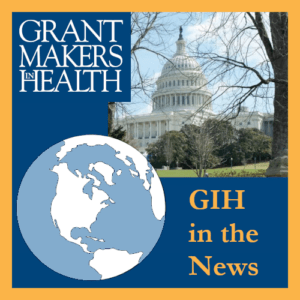Make Our Children Healthy Again Strategy Report
This resource provides an overview of the Department of Health and Human Services report on children’s health released on September 9, 2025.
Department of Health and Human Services Reorganization and Reductions: Explaining the State of Play
This issue brief provides an overview of the current status of the reorganization and Reductions in Force (RIF) at the Department of Health and Human Services (HHS) to help funders understand the impact on their work and engage in the current policy landscape.
Committing to the Long Game in Health Philanthropy
Today marked the official start of the 2023 Grantmakers In Health Annual Conference. Attendees were up bright and early to get to know Minneapolis, the home of this year’s conference and original site of the 2020 gathering.
Welcome to the 2023 GIH Annual Conference on Health Philanthropy!
Reporting from the 2023 Annual Conference on Health Philanthropy Preconference sessions begin in Minneapolis The GIH Annual Conference on Health Philanthropy, Advancing Philanthropy’s Commitment to the Long Game, kicked off yesterday afternoon with preconference sessions in Minneapolis. Conference participants had the opportunity to attend two preconference sessions: HERE to Listen: Listening for Racial Equity Impact…
A Conversation with Jill Shumann, Grantmakers In Health’s New Vice President for Programming
This month, Grantmakers In Health (GIH) President and CEO Cara V. James sat down with Jill Shumann, GIH’s new Vice President for Programming, to learn more about Jill’s long career in health and how her experience applies to GIH’s mission of advancing better health for all through better philanthropy. Jill discussed her formative years as a Peace Corps Volunteer, her work on international public health in Africa, and her recent tenure at the National Alliance on Mental Illness.
Purpose-Driven Investments: Advancing Equity by Diversifying Foundations’ Asset Managers
In 2020, none of the Health Forward Foundation’s assets were managed by Black, Latina, or Latino managers. Struck by that stark reality, Health Forward began the process of diversifying the asset managers in its investment portfolio as part of a larger strategy to align the Foundation’s capital with its purpose.






